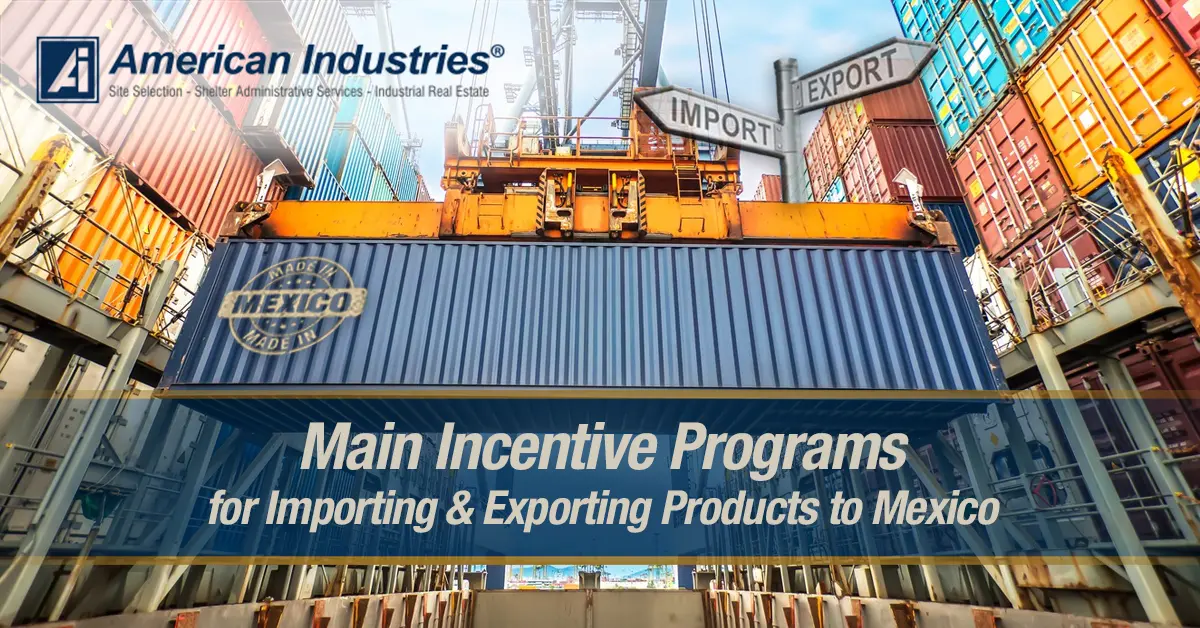The Strategic Role of Mexico in U.S. Trade: A Partnership Beyond Politics

Published 10/02/2024
Reading Time: 4 minutes
As the U.S. prepares for its next election, many wonder how the results could affect international trade—particularly with critical partners like Mexico. Yet, regardless of who takes office, one thing is clear: Mexico remains an indispensable player in the U.S. economy. From manufacturing to technology and supply chains, Mexico is key to U.S. business strategies. Nearshoring is strengthening this partnership, helping U.S. companies grow and stay competitive. With its ideal location and strong production capabilities, Mexico will continue to help U.S. companies build more resilient supply chains far into the future.
Geographical Proximity: A Competitive Edge
Mexico’s proximity to the United States has always been one of its most significant advantages. Sharing over 3,000 kilometers of border, Mexico offers U.S. companies shorter shipping times and lower costs compared to distant hubs like Asia, particularly in industries such as automotive, electronics, and manufacturing.
This geographical advantage enhances the manufacturing industry in Mexico, facilitating cross-border trade, improving efficiency, and allowing for quicker delivery of raw materials and finished products.
All this offers a more reliable and timelier alternative to more distant regions, where supply chain disruptions are common.
In addition, in an era where companies are prioritizing supply chain resilience, nearshoring to Mexico offers U.S. companies the opportunity to better manage risks associated with global disruptions. Whether it’s a pandemic or geopolitical tensions, manufacturing in Mexico minimizes delays and reduces dependency on unpredictable international shipping routes. This accessibility is crucial for industries with fast-paced production demands, reinforcing Mexico’s position as a top destination for Mexico manufacturing companies looking to streamline operations.
Mexico's Strengths as a U.S. Trade Partner
In addition to its proximity, Mexico offers several advantages for U.S. businesses. Mexico's workforce is both cost-competitive and increasingly skilled, especially in sectors like aerospace, electronics, and automotive manufacturing. Rising labor costs in Asia have increased the appeal of shifting production closer to the U.S., and Mexico production remains a high-value alternative. With its focus on technical education and industrial training and triple helix model, Mexico has cultivated a workforce that can meet the demands of high-tech industries, making it a global leader in manufacturing.
As industries like aerospace and automotive evolve, the need for innovation, efficiency, and skilled labor will only increase, positioning Mexico as a key production hub for high-value industries. As such, U.S. businesses will only continue leveraging Mexico manufacturing companies for precision work, particularly in sectors that require skilled labor and advanced production techniques.
The USMCA
Mexico's competitiveness is further amplified by the country’s extensive network of free trade agreements, providing U.S. companies access to global markets with fewer trade barriers, with one of the most important being the US-Mexico-Canada Agreement (USMCA). The USMCA offers a stable and predictable legal framework for trade between the U.S. and Mexico and serves as a cornerstone for North American trade relations, ensuring continuity in key sectors such as agriculture, manufacturing, and energy. Its clear rules give businesses the confidence to navigate international trade without concerns about sudden policy changes.
With consistent regulations, U.S. companies can make long-term investments in Mexico with greater certainty. The USMCA’s protections against tariffs and trade barriers allow businesses to plan their operations more effectively, creating an environment built on stability and predictability. This framework helps preserve the strength of the U.S.-Mexico relationship, even during political shifts, providing both countries with a reliable foundation for ongoing economic cooperation.
Expanding Opportunities: Technology, Energy, and Nearshoring
The future of U.S.-Mexico trade holds numerous possibilities, particularly in the areas of technology, energy, and nearshoring. Mexico’s growing renewable energy sector also presents exciting opportunities for U.S. businesses focused on sustainability. With increasing investment in wind, solar, and other renewable resources, Mexico is positioning itself as a leader in green energy. This aligns with global efforts to transition towards more sustainable production practices, offering new avenues for collaboration between U.S. and Mexican companies. The energy sector is a prime example of how both countries can innovate together, creating a mutually beneficial partnership that supports long-term economic growth.
The technology sector is another area ripe for expansion. Mexico’s tech industry is burgeoning, and its proximity to the U.S. tech hubs provides an ideal opportunity for collaboration. Companies can explore new technological advancements and streamline production processes by combining Mexico's skilled workforce with U.S. innovation. Mexico offers U.S. companies a unique opportunity
to expand technological capabilities in manufacturing automation or software development.
Preparing for Political Changes
While changes in political leadership in the U.S. may bring about policy shifts, U.S. businesses can mitigate risks by reinforcing their relationships with Mexican partners. Preparing for political change involves focusing on long-term strategies such as diversifying supply chains, increasing investments in Mexico manufacturing companies, and enhancing infrastructure. These strategies strengthen U.S.-Mexico business ties and ensure resilience in the face of policy shifts.
Without a doubt, election seasons in Mexico and the United States are always complex and polarized due to the size and commercial importance of the two countries. We have navigated through these times where extreme ideas are often used to serve political purposes. However, history has proven that the trade relationship between Mexico and the U.S. has endured and grown stronger over time, as evidenced by the ratification of the USMCA. U.S. and Mexican companies continue to benefit from this solid partnership. The trade balance between the two nations remains strong, with Mexico ranking among the top trading partners of the U.S. in both imports and exports, highlighting the importance of this bilateral relationship in maintaining economic stability for both countries.
The economic ties between the U.S. and Mexico are expected to remain strong. Mexico's strategic advantages—proximity, skilled labor force, and extensive free trade agreements—make it a key trade partner for the U.S. and the global market. If your company is looking to strengthen its supply chain, reduce costs, and improve efficiency, now is the time to explore manufacturing in Mexico. For over four decades, American Industries has helped U.S. companies establish and grow their operations in Mexico. With deep local expertise and a proven track record, we guide you through every step, from site selection to legal compliance and logistics.
Reach out to American Industries today to learn more about how nearshoring to Mexico can give your business the resilience and competitive edge it needs to thrive in a rapidly changing global market. Let us help you take advantage of Mexico’s strategic benefits and ensure long-term success and continuity for your operations.
American Industries Group®
If you would like to find out more about this topic or are interested in receiving a complimentary business case analysis for your operation in Mexico, please fill out this form or contact us at:
US toll-free: +1 (877) 698 3905
Attention hours from M to F 9:00 - 18:00 CST
Please note that we do not accept job applications here. If you are interested in applying for a position, please visit the following link: https://www.americanindustriesgroup.com/jobs/
YOU MIGHT ALSO LIKE









